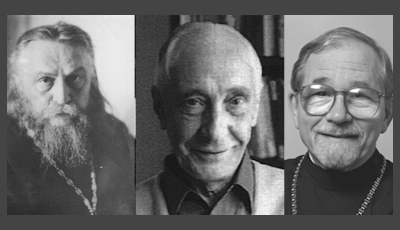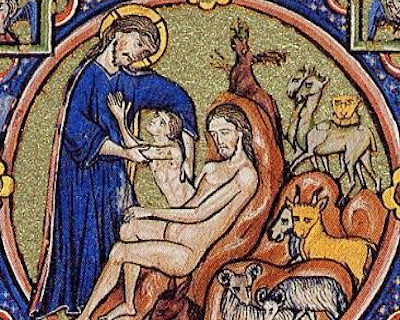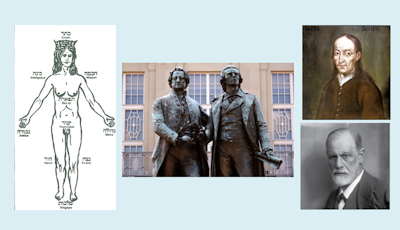What follows is a short essay in response to the following question: Using The Life of Mosesto illustrate, discuss Gregory's view of the relationship between philosophy and scripture.
The disclaimer:Essays for exams get tailored to answer the question at hand. There are a multitude of interesting things to say about Gregory of Nyssa (c335–c395 CE). Lately I've enjoyed reading Virginia Burrus's essay entitled, "Queer Father: Gregory of Nyssa and the Subversion of Identity," found in Queer Theology: Rethinking the Western Body (edited by Gerard Loughlin).

Although Greek philosophy informs the work of Gregory of Nyssa, it is clear that his theological views have moved beyond Platonism and Stoicism, becoming something new in their own right. Using The Life of Moses,[1] we will explore Gregory's understanding of the relationship between philosophy and scripture. Characteristic of his departure from Platonism is his understanding of the human body as a vessel for communion with God in a never-quite-consummated ascent known as epecstasy.
Gregory did not receive a formal education in Greek philosophy, but was tutored by his older brother Basil, whom he mentions as a model for using the acquired wealth of the pagan world for "the adornment of the Church, the true tabernacle."[2] In some ways sympathetic to pagan learning, Gregory suggests that "moral and natural philosophy, geometry, astronomy, [and] dialectic"[3] are all useful in supplying reason with the tools for contemplation of God. And yet, Gregory also warns of the limits of pagan understandings. He points out that both Stoics and Platonists believe God exists, but denies the Stoic claims that God is made of matter or that God is bound by fate rather than possessing absolute freedom.[4] He agrees with Platonic thought on the immortality of the soul; however, he rejects metempsychosis which claims the transmigration of human souls to another human or to an animal after death.[5] He also denies the eternal existence of matter (another Platonic idea), asserting instead the doctrine of creation ex nihilo.[6] In his less charitable moments Gregory attacks philosophy, which he characterizes as forever laboring, but never giving birth, instead being full of air and miscarrying before coming to understand the knowledge of God.[7] Thus, while various disciplines may provide some help during the storms of life,[8] nonetheless the teachings of "philosophy's generative faculty" (γονή) remain "fleshly and uncircumcised," "contaminated by … absurd additions." [9] Gregory's choice of metaphors alluding to the biblical motifs of circumcision and purity is one of many references that continually remind his readers of the primacy of scripture in his thought. [Instructor Comment: And of his eschatological horizon.]
In contrast to philosophy, Gregory sees scripture as a counselor and a beacon light that shows the way back to safe harbor for those "who wander outside of virtue."[10] As mentioned above, he breaks with Platonic mind/body dualism, insisting instead that the flesh can commune with God in what he refers to as the eternal progress (ἐπέκτασις) [11] or epecstasy. Eschewing the Platonic idea earlier embraced by Origen that souls (ψυχαί) somehow cooled in their love for God and became entrapped in human flesh, Gregory turns to envy as the source of the Fall from Paradise that estranged Adam and Eve from God and sank humanity deeper and deeper into despair through the stories of Cain and Abel, Lamech, and Joseph.[12] The antidote to envy is the mystical ascent, which Gregory exegetes from the story of Moses' continuous successes culminating in entering into God's presence at the cleft of the rock: "the one who is going to associate intimately with God must go beyond all that is visible and (lifting up his own mind [νοῦς] to the mountaintop, to the invisible and incomprehensible) believe that the divine is there where the understanding does not reach."[13]
By this exegetical interpretation, Moses leaves behind the worldly wisdom of his Egyptian upbringing (philosophy), enters the (ascetic) life of the desert shepherd where he encounters God in the burning bush. He removes his sandals (the limitations of his earthly skin[14]) to walk on holy ground. In these and each successive episode of the story – from the freeing of the children of Israel, to the marching through the Red Sea, to the camp beneath the cloud, to the miraculous supply of water and manna from heaven – is given a spiritual interpretation of attaining to greater and greater heights.[15] In contrast to the envy that caused humans to become ensnared and fall from idyllic Paradise, this hunger for God is met each step of the way with new gifts from the infinite Divine that knows no bounds.[16] Never satiated, this spiritual desire grows with each step and is in turn continually met from the well of the infinite as the seeker draws ever closer to God.
Through this new idea of eternal progress or epecstasy, Gregory moves beyond the Platonic ideal of static unity[17] in favor of a new model which beckons the Christian on to ever newer levels of perfection, attained in communion with God. Rather than the human body being seen a somehow evil, it becomes the nexus through which God and human meet in ever deepening communion. This break with Platonic philosophy will play a formative role in the Eastern Orthodox understanding of theosis in ages to come.
[Instructor Comment: Excellent essay]
[1] Translation of Life of Moses can be found in Malherbe and Ferguson (trans.), Gregory of Nyssa: The Life of Moses New York: Paulist Press, 1978). Occasional references to the end matter commentary will also be noted below.
[2] Gregory of Nyssa, p. 2; Life of Moses II.116
[4] Life of Moses II.40; Gregory of Nyssa p. 165, n. 64, 66
[5] Life of Moses II.40; Gregory of Nyssa p. 164, n. 63
[6] Life of Moses II.40; Gregory of Nyssa p. 164, n. 65
[9] Life of Moses II.39, II.41; Gregory of Nyssa p. 164, n. 60
[11] Gregory of Nyssa p. 146, n. 61
[14] Gregory of Nyssa p. 160, n. 29: This is not the body per se (which is not bad), but the fleshly desires added to humanity at the clothing with animal skins and expulsion from Paradise.





[...] believe that the divine is there where the understanding does not reach."[13] Gregory of Nyssa and Greco-Roman Philosophy | fides quaerens intellectum __________________ To view links or images in signatures your post count must be 10 or [...]